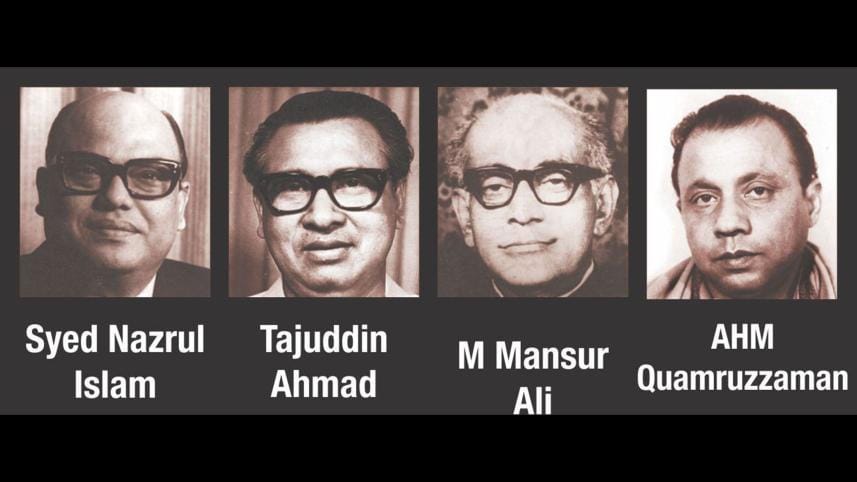Looking at the November coups through a neutral lens

Newspaper articles published on the military coups held in Dhaka in November 1975 are often coloured by the authors' political standpoints and ideologies. Instead of making an unbiased and objective assessment of historical events, attempts are made in such articles to highlight particular facts and extol certain individuals. In her 1967 essay Truth and Politics, the German political philosopher Hannah Arendt notes that historical reality is sometimes distorted in order to attain specific political objectives or to support certain people. For her, through the purposeful omission and denial of facts known to everyone, an alternative reality is often constructed that remains far from being factual. It would be a shame to see similar tendencies in our country that may lead to the creation of a substitute reality. Critical and impartial analysis is of utmost importance in articles dealing with historical facts in order to keep people informed of the whole truth about particular events of the past.
Ziaur Rahman, Khaled Mosharraf, and Abu Taher—three military officers became key figures in the coups of November 1975. All of them were decorated freedom fighters. In 1971, they fought valiantly for the independence of Bangladesh. But, after four years they came up against each other and the country witnessed the tragic consequences of their conflicts. After August 15, 1975 Majors Farook and Rashid and a few other junior officers involved in the killings of Bangabandhu Sheikh Mujibur Rahman and his family members and close associates, attained power through their close association with the new President Khondakar Mostaq Ahmad. These junior officers started showing a total disregard for the army chain of command. New Army Chief Ziaur Rahman did not force them to return to the cantonment.[1]
On November 3, then Chief of General Staff of the army Khaled Mosharraf and his loyal officers took measures to bring these junior officers under control. The Khaled-led coup began by placing Zia under house arrest. The battle-seasoned infantry regiments and the fighter jets of the Air Force were ready to help Khaled against 1st Bengal Lancers, the sole tank regiment of the Bangladesh Army and 2nd Field Artillery Regiment, the two units that took part in the killing of Bangabandhu and were loyal to Farook and Rashid. In the following few days, the junior officers departed the country, and the president and the army chief offered their resignations. Khaled Mosharraf became the new army chief. However, the success of Khaled Mosharraf's coup was short-lived.
After taking an early retirement from the army in 1972, Abu Taher started working in a government organisation. He also joined the left-wing political party Jatiya Samajtantrik Dal (JSD) secretly and became the head of the party's combat wing named Gono Bahini.[2] A secret branch of Gono Bahini named Biplobi Sainik Shongstha (Revolutionary Soldiers' Organisation) was formed in the army.[3] Abu Taher instructed the soldiers of this outfit to start an ordinary soldiers' revolution on November 7 with a view to transforming the armed forces into a people's army committed to safeguarding the interests of the underprivileged class. He also instructed them to free Ziaur Rahman on November 7.[4] Leaflets conveying 12-point demands of Biplobi Sainik Shongstha were distributed among the soldiers in Dhaka Cantonment.[5] They demanded that the differences between officers and soldiers should be abolished, and the officers could not be recruited separately.[6] When soldiers loyal to Taher staged a revolt on November 7 by chanting slogans seeking unity of ordinary soldiers, the infantry battalions loyal to Khaled became confused and did not try to suppress the counter-coup.[7] Khaled Mosharraf took shelter in an infantry battalion which came from Rangpur Brigade to support him. But, Khaled was ruthlessly murdered in this battalion.[8]
The soldiers freed Ziaur Rahman and he was reinstated as the army chief. Much to Taher's dissatisfaction, Zia did not show any interest in abiding by most of the demands of Biplobi Sainik Shongstha.[9] Within a few weeks Taher was arrested. Biplobi Sainik Shongstha could not offer any resistance to this decision. Mainly the JCOs, NCOs and soldiers of the supporting arms such as Signals and different army services such as Ordnance, Supply, EME, AMC, etc. and some airmen were members of Biplobi Sainik Shongstha.[10] Although they organised the revolt against Khaled Mosharraf, Bengal Lancers and 2nd Field Artillery played the pivotal role in making the counter-coup successful. Fearing that they would be severely punished for their involvement in August 15 killings, the members of these two units became desperate to depose Khaled Mosharraf. Thus, they actively joined the action on November 7.[11] They had no loyalty to Taher whatsoever.[12] In 1976, through a controversial trial, Abu Taher was hanged. Although Ziaur Rahman triumphed over adverse circumstances and his rivals for the time being, he was assassinated by some military officers in 1981.
Most of the army and air force officers actively taking part in the Khaled-led coup were freedom fighters. But, some freedom fighter officers of the infantry battalions were close to Zia.[13] They did not directly express discontent at Khaled's coup, but they also did not give Khaled their total allegiance. In order to keep a tight grip on the situation it was necessary for Khaled to communicate with the officers and soldiers throughout the country and keep them informed of his aims. But, despite the request from the other officers, Khaled did not give a speech on the radio.[14] As no speech was given on the radio for three days, the civilians as well as the military units remained confused about the incidents happening inside Dhaka Cantonment. Khaled's detachment from the rank and file made it easier for Biplobi Sainik Shongstha to stimulate the ordinary soldiers to take part in a rebellion against the officers.
Khaled's coup was important because it neutralised the tank and artillery regiments involved in the killing of Bangabandhu. Khaled and his companions compelled the mutinous troops of Bengal Lancers to return to cantonment with their tanks. But on November 7, those tanks came out of the cantonment again and jubilant Lancers soldiers rejoiced on the roads carrying photos of Mostaq.[15] In a meeting on November 6, Taher and the leaders of Biplobi Sainik Shongstha finalised their plans for the uprising. They did not prevent the right-wing soldiers of Bengal Lancers from participating in that meeting.[16] How could Taher and the JSD leaders expect that the right-wing soldiers totally devoted to the killers of Bangabandhu would wholeheartedly support a left-wing revolution?
In the early hours of November 7, Major Mohiuddin, an artillery officer involved in the killing of Bangabandhu took Ziaur Rahman to the 2nd Field Artillery Regiment.[17] Both freedom fighter and repatriated officers close to Zia gathered in 2nd Field Artillery office and started cooperating with Zia. Within a short time it became clear that neither Zia nor the other officers had any intention of changing the traditional structure of the army. Some soldiers remained unruly for a few days, but soon they were made to obey the chain of command. The majority soldiers of the armed forces did not insist on implementing the demands of Biplobi Sainik Shongstha. As most of the soldiers were not eager to see revolutionary changes in the army, such an endeavour was bound to end in failure.
Khaled and his fellow officers did not try to free four national leaders immediately after commencing their coup. But, as soon as the killers of Bangabandhu became aware of an imminent offensive against them, they sent a small group of soldiers to the central jail to eliminate the national leaders. It is known that Khondakar Mostaq telephoned the IG Prison and ordered him to allow the armed soldiers to enter the jail.[18] The soldiers went to the cell where the four leaders were kept and brutally killed them. Khaled and his companions were busy negotiating with the junior officers and Mostaq in order to find a solution. They did not think of the necessity to tighten security of four leaders in that precarious situation and did not even hear that the leaders had been slain.[19] They heard about the heinous assassination only after the departure of Farook-Rashid and their cohorts from the country. Khaled's coup removed the killers of Bangabandhu from the position of power but it was a major failure of Khaled and his companions that they could not save the four national leaders.
On November 7, Khaled Mosharraf and two other eminent freedom fighter officers, Colonel Najmul Huda and Lt Colonel ATM Haider, were killed in 10 Bengal Regiment. During the Liberation War, K Force was formed under the leadership of Khaled Mosharraf and 10 Bengal Regiment was one of the units of K Force.[20] Thus, it was likely that the officers and troops of this regiment would protect their wartime commander from danger. But Khaled, Huda, and Haider were brutally killed in this regiment by a few officers and soldiers.[21] It is still unknown who instigated or ordered them to kill these renowned freedom fighter officers. A thorough investigation is necessary to identify the person or people responsible for the murder of the three war heroes on November 7, 1975.
Dr Naadir Junaid is professor, Department of Mass Communication and Journalism, University of Dhaka.
[1] Shafaat Jamil, Ekattorer Muktijuddho, Roktakto Moddho-August o Shorojontromoy November (Dhaka: Sahittya Prakash, 1998), 130, 132. [2] Altaf Parvez (edited), Ashamapto Muktijuddho, Colonel Taher o Jasad Raajniti (Dhaka: Pathak Shamabesh, 1995), 101; Hafiz Uddin Ahmad Bir Bikrom, Sainik Jibon: Gowraber Ekattor, Roktakto Pochattor (Dhaka: Prothoma Prokashon, 2020), 211. [3] Ibid, 100. [4] Dr. M. Anwar Hossain, Mahan Muktijuddho o 7 November Obbhutthan e Colonel Taher (Dhaka: Agami Prokashoni, 2012), 88-90; Altaf Parvez, 135. [5] Dr. M. Anwar Hossain, 89. [6] Altaf Parvez, 135. [7] Shafaat Jamil, 145-46; Major Nasir Uddin, Gonotontrer Biponno Dharai Bangladesh er Shosotro Bahini (Dhaka: Agami Prokashoni, 1997), 148. [8] Major Nasir Uddin, 151; [9] Ibid., 148-49; Hafiz Uddin Ahmad, 227-28. [10] Altaf Parvez, 135; Hafiz Uddin Ahmad, 228. [11] Hafiz Uddin Ahmad, 228; Altaf Parvez, 144. [12] Ibid. [13] Major Nasir Uddin, 125. [14] Major Nasir Uddin, 136; Hafiz Uddin Ahmad, 207-08, 225. [15] Hafiz Uddin Ahmad, 228; Altaf Parvez, 144. [16] Dr. M. Anwar Hossain, 99-100. [17] Shafaat Jamil, 144; Hafiz Uddin Ahmad, 221. [18] Hafiz Uddin Ahmad, 198; Mohiuddin Ahmad, Bela Obela: Bangladesh 1972-1975 (Dhaka: Baatighar, 2020), 293. [19] Hafiz Uddin Ahmad, 198; Shafaat Jamil, 136. [20] Jafar Imam Bir Bikrom, Dam Diye Kinechi Ai Bangla (Dhaka: Oitijjhya, 2016), 65. [21] Shafaat Jamil, 144-45; Hafiz Uddin Ahmad, 223.




 For all latest news, follow The Daily Star's Google News channel.
For all latest news, follow The Daily Star's Google News channel.
Comments